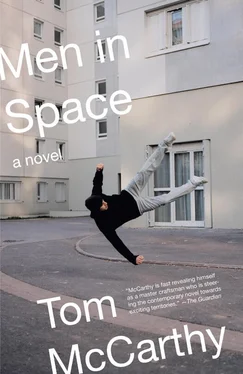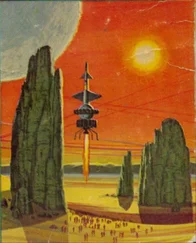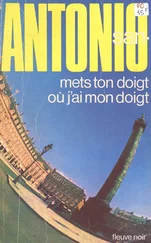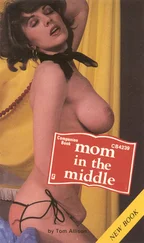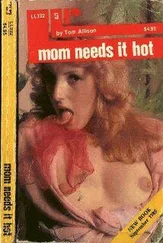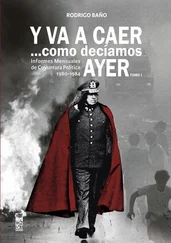The streets were full of people. As I made my way through Nové Město, their number grew larger. After a while, crowds were flowing round my car, and I found it increasingly difficult to progress. The crowds were in the highest possible spirits. I tried to clear a swathe through them by first using my horn, then affixing to my car’s roof my police light — but by the time I’d reached Náměstí Republiky even this didn’t work, so thickly were the revellers hemmed together. I thought it best to leave my car and continue home by foot, taking only my directional microphone with me. Emerging from its cabin, I found the noise overwhelming. The ringing in my ears was compounded by shrieks, whistles and the almost constant explosion of fireworks all around me. The sounds all ran together; I was unable to distinguish one from another. The sensation was extremely disorienting. I believe I may have panicked slightly: I remember shouting at people to let me by, but none of them seemed to hear me. I myself could not make out my own voice above the noise, nor even be sure that my vocal cords were amplifying it at all. I have no clear recollection of arriving home, nor of the noise subsiding. It was only when …
* * * * *
The English grass seems greener. Maybe it’s the climate: Nick said it really did rain all the time there. Maybe they use hi-tech fertilizer. Maybe they even paint it, like they do Astroturf in America. The players slide across its rich green surface, pool balls over felt, stripes turning and colliding, numbers on backs organizing themselves into rows and phalanxes, then breaking apart and reorganizing, like some living algorithm. White lines and boxes channel them, imposing structure on contingencies of movement, herding chance into patterns. An intermittent crackle comes from the set’s speakers, drowning out the commentator. It’s not static: the reception’s good — the Žižkov tower is only a few blocks away. No, it’s the crrkk! of the crowd’s applause, swelling as the ball floats past the goal post, past fluorescent yellow English police on dark brown horses, orange-coated ground staff, this strange ocean of colour beamed to them through outer space …
“Helena? Have you got …” Ilievski’s holding up his cigarette as though it were something he’d just found behind the sofa. It’s almost half smoked; a tall column of ash is bending sideways from the vertical lower half.
“What? Oh! Sorry, Constantine. I’ll just go get one.”
“Bring some nuts as well, honey.” Anton’s craning forwards at the TV, as though worried that he’ll miss some detail if he spreads out and relaxes. “Liverpool are favourites here,” he says, explaining this ostensibly for Ilievski’s benefit, although he’d probably do it if Ilievski weren’t there. “They’ve got Redknapp, McManaman, Barnes, Matteo, Fowler — and Rush, of course. And they’re at home. And the statistics bear this out: they’ve had three corners, Bolton none. Two, now three shots at goal. Played mostly in the other half, their opponents’ one …”
“Didn’t the Liverpool team all die in some coach crash or something?”
“A plane crash, yes — but it was Manchester United, not Liverpool. In nineteen fifty-eight, in Munich. Not just Manchester United: half the English team as well. The Man U players were so good that half of them were playing for the national side.”
“It’s always sporting teams.” Ilievski’s speaking cautiously, without gesturing, so as not to tip the ash column over. “That, and rock stars. Never get into an aeroplane with a rock star or a football team. That’s my advice to you. When you and Helena and,” he lowers his voice, eyes darting to the door, “the children — when you all go over to America, my advice to you is that before you step onto that plane, just as you’re checking in your luggage, ask if there are any rock stars or football teams on it. Keep still Rambo. And if there are, don’t get on board. Film stars are alright, mind. Thank you Helena.” He removes his cupped left hand from underneath the right one, which then slowly steers the cigarette towards the ashtray she’s brought for him, but the column drops just short. “ Fuck it! I’m sorry!”
“No worry. I’ll get a cloth.” She sets the nut bowl on the side table and goes back into the kitchen.
“Bring some nuts, honey.”
“She did. They’re right beside you.”
“Oh? Good.”
“What’s that, Anton?” Helena calls through the wall.
“Nothing. I just wanted … It’s a corner. Came off McAteer.”
“We’ll take it out of here tomorrow.” Ilievski balances what’s left of his cigarette on the rim of the ashtray. “The painting. The fake one, I mean. Anton.” He’s looking at the two paintings that are leaning against the filing cabinet beside the television, eyes moving from one to the other then back again.
“Right. Look: Fowler’s going to take it. How are you going to let it be found by the police, then?”
“It’s going to our people in Vienna. They’ll leave it with a gallery, who’ll check it against Interpol’s art loss register as a matter of course, and call the police in when they realize what it is — I mean, what they think it is. If they don’t recognize it straight away, of course.”
“It’s that high profile?”
“Oh yes.”
“Might someone not eventually discover it’s a fake?”
“Perhaps, eventually; perhaps not. But that’s not our problem. As far as we’re concerned, all that matters is that it’s taken off the art-loss register for long enough for us to move it around and unload it.”
The ball’s been curved too fine, and flighted too high anyway. It drifts above a wedge of straining heads and catches in the goalkeeper’s gloved hands. The crowd crrkk! Anton cracks a pistachio. Ilievski says:
“The real one stays here till the people in Sofia give the go-ahead. You might like to rewrap it and take it down to your cellar, just as a precaution.”
“OK. I’ll do that. Look: there’s the whistle. Half-time. He’s done well so far, this referee. He’s let the game run smoothly, not held it up. More wine?”
“Are you back with us now?” Ilievski stubs out his cigarette. “Sure. I’ll have another glass. First day of the new year. Happy New Year, Rambo. Cheers, Anton.”
They clink glasses. Ilievski asks:
“Which is the real one?”
“The one on the left.” Anton gets up, walks over to the paintings and crouches beside them. “Maňásek made a small red mark on the side, right here,” he says, tapping it. “Good thing he did. They’re hard to tell apart.”
“That’s what we paid him for. Funny painting, huh?”
Anton straightens his legs, then comes and sits beside Ilievski again. “We looked at it lots, Helena and I, when I brought it up here last night. We were trying to work out who the figure is.”
“Isn’t it Jesus?”
“Helena doesn’t think so. He always has long hair. Isn’t that what you said, honey?”
“Is it half-time?” She’s dabbing at the ash mark on the sofa with a damp cloth. “Oh, the painting. Yes, it’s strange. Quite beautiful. But that’s a very odd shape at the top he’s rising into. It’s kind of egg-shaped — like in those Dutch Renaissance paintings that have different planes. As though if you moved around and looked at it from another angle there’d be a different painting: another work entirely, with its surface angled differently, in line with the oval.”
“I don’t know about the Dutch Resistance,” says Ilievski, looking round her. “But I’ll tell you this: I think the birds are kind of funny.”
“See that, Helena? He thinks they’re birds as well.”
“I don’t.” She crouches down like Anton did a moment ago by the two paintings. “I think they’re humans who are falling down the mountain.”
Читать дальше
